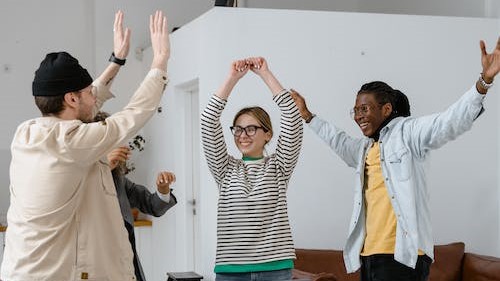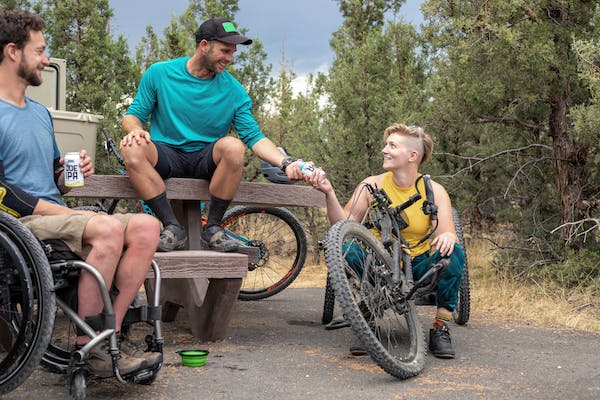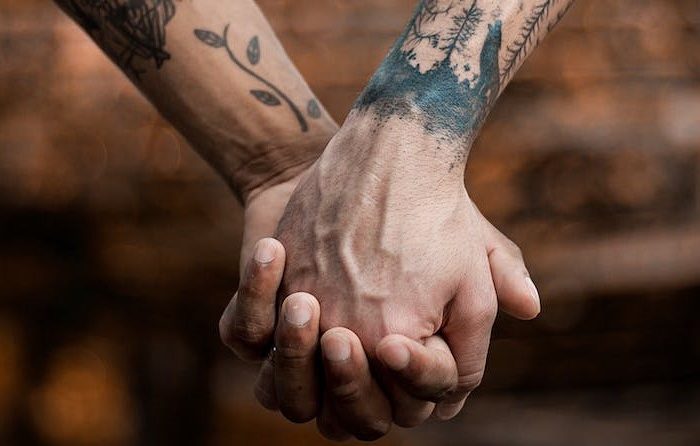
Everything else you need to know about Madagascar
This blog follows my “10 essential things to know about Madagascar“.
Before coming to Madagascar there was a lot I didn’t know. So, I’ve put together few things I think it’s helpful/interesting to know! I went with my husband for a 12 night safari visiting 4 national parks and staying in 2*-3* accommodation (so I have no experience of bringing children or higher rated accommodation, for example). I hope you’ll find the following helpful! Please do comment below if you have any questions or what to add anything about your experience!
Money
1The currency is the Malagasy Ariary which is only available in Madagascar – it is best to buy it at the Airport. It’s best to have Euros or Dollars to change once you’re through visa/security etc. You can get by with a traveller card but you have to be visiting cities with ATMs and be prepared to get cash out multiple times as the daily limit isn’t very high.
It is a tipping culture – everyone who helps you out will be relying on tips to boost their pay. For example, porters expect 1000-5000 Ariary (20p-£1). It’s important to have a supply of small notes. It is polite to tip 5000-15,000 Ariary/day (£1-£3) to a driver and 10,000-20,000/day (£2-£5) to a guide. They rely on the tips for basics like feeding their family.
Restaurants etc don’t always give change, they consider any extra given as a tip – we found this strange at first (as we prefer to choose how much we tip but it was dependent on what notes we had) but we had a accept that this was their culture (and to us, we were only paying a few extra pennies each time, anyway).
Food and Drink
Rice and zebu (Malagasy mammal similar to a cow with a hump) are staple foods. They eat this for breakfast, lunch and dinner. Hotels expecting tourists will offer, what they call, an “American breakfast” that usually includes French pastries or bread, eggs (fried, scrambled, omelette or hard (medium boiled)), coffee or tea, fruit and fruit juice – it is up to you which you choose.
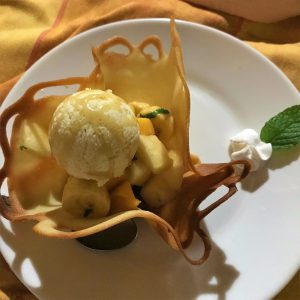
They know what a vegetarian/vegan is but be prepared for lots of spaghetti and Chinese food. For some reason they think that’s all we eat. I don’t know why since their staple food is rice and they cook with beans and (limited) veg so I don’t know why they can’t just adapt the meat dishes but on repeated occasions when asking for the vegetarian options and it was spaghetti – eventually I said I didn’t want spaghetti and one place gave me the meat dish without the meat (they didn’t think to put any other protein on it but I was just grateful it wasn’t spaghetti!), another place just gave me the sides…that was a plate a veg, not ideal but not awful!
Be aware, there are no diet drinks available, you can get water everywhere but soft drinks such as Coco-cola, Fanta and Sprite soft drinks are the full sugar versions. They also have a drink only available in Madagascar called called Bonbon Anglais which tastes like a sweat shop on steroids!
If you’re eating dinner in the accommodation where you’re staying, they may ask you to book/order your dinner food before the time you want to eat – we never really understood why this was but thought it best just to do what we were asked!
You will need to buy a lot of water – it is relatively inexpensive but you’ll need to ensure you can buy from a safe source (for example petrol station shops), unless your tour company provide it. You need water for drinking and washing teeth; it’s ok to shower in the water but it’s not advisable to swallow any
Other practical bits’n’pieces
Police may stop you at the entrance and exit of towns/city – this is nothing to worry about, they want to see the documents for the vehicle.
Public toilets are pretty vile – where as men may pee at the side of the road, it’s not as easy for ladies so it’s good to take advantage of toilets within hotels restaurants etc whenever possible, where they have toilet paper, an actual toilet and a door that locks…enough said!
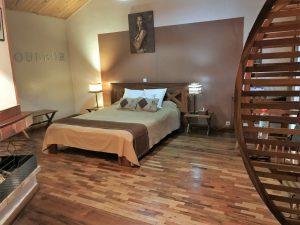
Some accommodation has a limit on what you can plug into their electricity – do not expect to be able to use a hair dryer or kettle but you can charge a phone. If you plug something too large into the mains, it will cut the power but don’t worry they’re used to travellers doing this!
There can be long drives from one region/city to the next but if you have a good guide, they will offer stops at workshops in the small villages where they are keen to show you their craft – they’re very proud of anything that originates in Madagascar from cotton and silk to sapphires and recycled aluminium pots. You do not need to pay or tip for the tour of the workshop but they appreciate you buying something from them, even something small, this helps the individuals working in the workshop and the economy in general.
Some roads are straight and well maintained, others are not! If you get motion sickness, and are doing a tour/safari of any kind, you’ll probably need to take precautions most days.
Our experience of 2*-3* accommodation was that it was fairly basic but clean (which was the most important thing for me). The bed and pillow are not always the most comfortable but they’re adequate. They do not offer any extras such as kettle or water unless you’ve got an ‘apartment’ where you’ll have cooking facilities. They do all have mosquito nets of varying designs.
If you’re taking an internal flights, be prepared for Air Madagascar to change flight times at the last minute. Our flight was changed twice, the second time whilst we were on our way to the airport! We spent a few extra hours in a hotel so it wasn’t a problem since we’d allowed extra time before our international flight home.
It’s a good idea to take extra luggage space as they really appreciate you contributing their their economy and when visiting workshops they are grateful to you if you buy some of the crafts etc.
Culture
You don’t necessarily need to know any of this before you go but I think these are some interesting points:
Malagasy people are generally very friendly – the language barrier can be difficult if you don’t speak French but we found people very eager to help.
Malagasy people are grafters. If they’re serving you in some way, for example guiding or in a restaurant, they want to give you the best possible experience – you can ask anything you they will do their best to answer/provide for you.
Some people do not like having their photo taken as it, it is considered taboo. Conversely, some people are very happy to have their photo taken, the couple in a house we visited actively wanted their photo taken so they could see what they looked like as they didn’t know – the best policy is to just ask and be sensitive.
In the south they practice polygamy – men actively advertise that they are looking for their first wife, then second and third by placing a comb at the front or back of their hair.
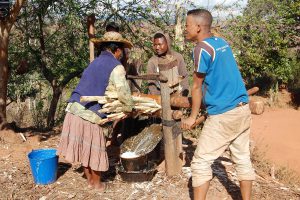
In the poorer villages, the average age to get married is 15, by 12 girls will already be starting to look for a husband.
Zebu stealing is a big problem – it is against the law but it’s a widespread tradition for a boy to be expected steal a zebu to show he is ready for marriage.
All baby boys are circumcised – they do it in winter and use the cold as the anaesthetic, the oldest male of the family then eats the foreskin with rum and banana. A boy who has not been circumcised is considered a girl.
We were told on multiple occasions “Madagascar has everything” – this is actually quite true, they produce all sorts of foods etc and manage very well with a fairly basic lifestyle. What they do produce is generally very good quality, for example, the rice they produce is high quality and therefore expensive so they export the rice they produce and import a low quality affordable one for their population to buy and eat – I found this quite sad but I can see why they do it.
Would I recommend Madagascar? Definitely. Are there any down sides? Not really – if you can cope with the poverty and are happy to do your bit to help the economy, it’s all good! I’d recommend going now with an established tour company before the hoards discover it!


